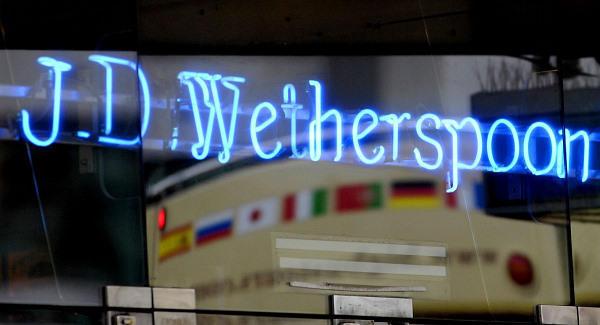Living wage could be a bitter blow, Wetherspoon’s boss Tim Martin warns
Chairman Tim Martin warned on Wednesday that the United Kingdom government’s recent announcement regarding the introduction of a “national living wage” is likely to hit the pub industry on the whole.
In supermarkets, a pint is priced at £1 with staff costs estimated to be around 10p. “Increased labour costs therefore affect pubs with far greater force than supermarkets”, Martin said. Operating margins have shrivelled, too, down 130 basis points over the 11 weeks, and the company has already warned that full-year pre-tax profit will either be flat or down on last year.
In the 11 weeks to July 12, like-for-like sales at Wetherspoons pubs climbed 2.9pc, while total sales grew 6.5pc.
However, a sizeable portion of the staff costs are in the group’s head office, with Nigel Parson, an analyst at Canaccord Genuity, estimating that around 60% of Wetherspoon’s wages are paid to employees serving in its pubs.
Wetherspoon’s shares dropped 8% Wednesday to 712p and look set tio test technical support at around 700p.
Arguing the living wage would shake the grounds of the pub industry, he said: “This disadvantage is compounded by a huge Value-Added Tax and business rates disparity between pubs and supermarkets, which is putting unsustainable pressure on many pubs in our industry, especially in smaller towns and less-affluent areas”. It guided to a full-year operating margin of 7.4 per cent, down from as much as 10.2 per cent in 2009.
Wetherspoon, which operates more than 900 pubs, had already agreed to raise its average minimum pay by 8 per cent from August to £7.29.
He added: “We suspect that higher wages not only to JD Wetherspoon’s staff, but also more widely for other workers from the subsequently announced living wage, will boost spending in JD Wetherspoon’s pubs”. It is the group’s present intention to open between 20 and 30 pubs in the next financial year and it recently announced its intention to sell 20 pubs which no longer fit its requirements. Preliminary results will be reported on September 11th.
The company called on the government to bring VAT sales tax and business rates for pubs into line with those enjoyed by supermarkets in order to stem the flow of British pubs closing down. Positive aspects include an increase in pub numbers, a better economy and slightly lower interest rates.
“We now anticipate a trading performance similar to, or slightly above, the current year, with an increased second half weighting, and will provide updates in our regular statements in the course of the next 12 months”, he added. This, they say, is due to ongoing competition from supermarkets and increased staff costs.








